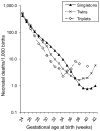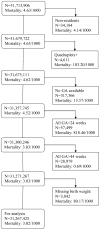Mortality risk among preterm babies: immaturity versus underlying pathology
- PMID: 20407380
- PMCID: PMC2967434
- DOI: 10.1097/EDE.0b013e3181debe5e
Mortality risk among preterm babies: immaturity versus underlying pathology
Abstract
Background: Deaths among preterm births are presumably due to both immaturity and the conditions that cause preterm birth. Their relative contributions are unknown.
Methods: Using US birth certificates (1995-2002), we estimated what portion of preterm neonatal mortality may be attributable to immaturity alone. Twins have elevated mortality, yet they usually have lower mortality than singletons at most preterm weeks. Twinning itself is a cause of early birth. Thus, at any given preterm week, singletons are more likely than twins to have pathologic causes of preterm delivery. If any such cause is associated with a mortality risk higher than that conferred by twinning, it is possible for singletons to have higher mortality than twins at some preterm weeks. Thus, mortality of twins at those weeks comes closer to describing the risk due to immaturity itself. To exclude high-risk babies, we focused on singletons and twins least likely to have suffered fetal growth disruptions (ie, those with "optimal" birth weight). At each gestational week from 24 to 36, we identified (for twins and singletons separately) the 500-gram weight category with the lowest neonatal mortality, and selected the lower of the 2 mortality rates.
Results: Using the above as our best estimates of mortality due to immaturity alone, we calculated that about half the mortality of singleton preterm babies was due to the pathologies that cause early delivery.
Conclusions: Factors that cause preterm birth apparently contribute a large proportion of preterm mortality. If so, the prevention of preterm mortality requires more than the postponement of delivery.
Figures





References
-
- Lie RT. Invited commentary: intersecting perinatal mortality curves by gestational age-are appearances deceiving? Am J Epidemiol. 2000;152(12):1117–9. discussion 1120. - PubMed
-
- Villar J, Abalos E, Carroli G, Giordano D, Wojdyla D, Piaggio G, Campodonico L, Gulmezoglu M, Lumbiganon P, Bergsjo P, Ba’aqeel H, Farnot U, Bakketeig L, Al-Mazrou Y, Kramer M. Heterogeneity of perinatal outcomes in the preterm delivery syndrome. Obstet Gynecol. 2004;104(1):78–87. - PubMed
-
- Barros FC, Velez Mdel P. Temporal trends of preterm birth subtypes and neonatal outcomes. Obstet Gynecol. 2006;107(5):1035–41. - PubMed
Publication types
MeSH terms
Grants and funding
LinkOut - more resources
Full Text Sources
Medical

